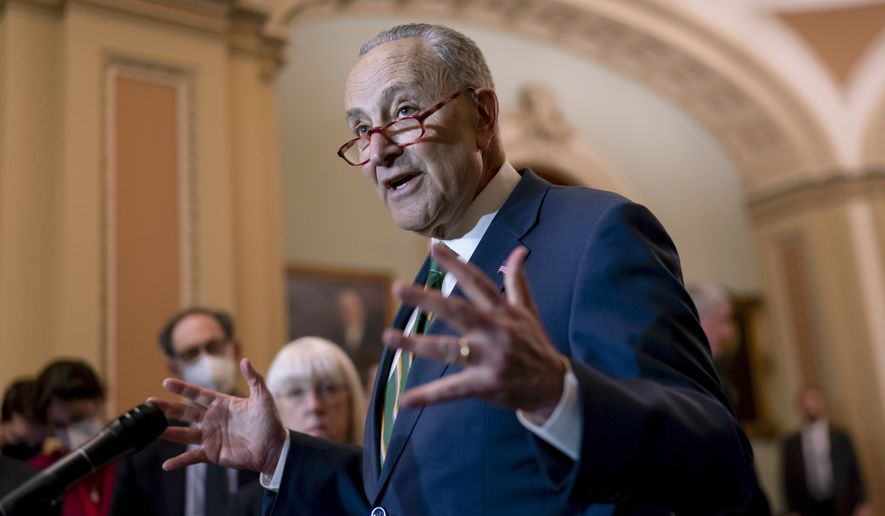A hard-won deal to fund the COVID-19 fight remained stuck Wednesday as Senate Democrats accused Republicans of derailing the effort with “poison pills” and GOP senators said President Biden is sending mixed messages on the pandemic.
Negotiators finalized a $10 billion package to bolster testing, secure treatments and vaccine doses. But GOP senators blocked a motion to begin debate on the package late Tuesday, saying they want a vote on reinstating a pandemic border emergency order that helped to stop illegal aliens from entering the U.S.
Senate Majority Leader Charles E. Schumer accused Republicans Wednesday of using the border issue to gain an upper hand, politically, on a charged issue ahead of the midterms.
“The Senate Republicans, to a person, blocked the ability to move forward and get this legislation done because they wanted to play politics and inject extraneous issues into the debate. But it’s not going to deter us from getting this done,” the New York Democrat said.
“It’s certainly better to act now rather than pay ten times down the line,” he said. “We are going to keep working to make sure that Congress sends COVID funding to the president’s desk.”
The path forward remains unclear.
Republicans said the border measure, known as Title 42, is relevant to the pandemic debate because former President Donald Trump used it to keep the virus from spilling over the border with migrants.
It was one of the few get-tough immigration measures Mr. Biden preserved, though the Centers for Disease Control and Prevention said it will lift the order on May 23. Republicans and some centrist Democrats are worried the change will spark a migrant surge.
“This idea we’re going to repeal Title 42, which is the COVID restriction at the border, but we still need billions more COVID dollars here really significantly complicated getting this done and probably prevents it from getting done this week,” Sen. Roy Blunt, Missouri Republican, told CNBC’s “Squawk Box.”
Senators had been hoping to finalize the deal before they leave town for a lengthy Easter recess that starts this weekend.
Mr. Blunt said the CDC was guilty of terrible timing for announcing Friday its decision to end Title 42.
“The CDC announced the change in their view of the impact of COVID and frankly that’s all some of our members needed to decide well we’re not going to deal with the COVID issue on spending unless we have a chance to talk about the COVID issue at the border,” Mr. Blunt said. “This would suggest they’re politically tone-deaf to put that statement out at the same time we’re trying to increase by several billion dollars the COVID spending numbers.”
Sen. John Thune, South Dakota Republican, said the administration lifted Title 42 even as it requires staff and children age 2 and older to wear masks at Head Start facilities and extends a pause on student loan payments through the end of August.
“Think about the inherent contradiction, the message that you are sending,” he said.
Mr. Thune said Title 42 was not supposed to be in place forever, but Mr. Biden hasn’t developed a border plan that would justify lifting it now.
Sen. Richard Burr, North Carolina Republican, said the Biden administration “wants to have their cake and eat it, too.”
“They want to tout America’s return to normal following the pandemic, but also want to keep extending emergency relief policies,” said Mr. Burr. “It’s long past time for student loan repayments to resume as normal. Extending the freeze on student loan repayments, yet again, contradicts reality and exacerbates the moral hazard this administration has created.”
White House press secretary Jen Psaki said the country is still recovering from the pandemic so the loan-payment freeze will let Americans “breathe a little easier.”
She said the administration has been clear about its COVID-19 funding needs and it wants lawmakers to get moving. She held up a 385-page binder full of information the White House provided to Congress about how previous money had been used and what it needs moving forward.
“The virus is not waiting for Republicans in Congress to get their act together,” Ms. Psaki said.
The administration says it will run out of money for monoclonal antibodies and other treatments and need a cash influx to secure additional boosters that might be recommended for the general population later this year. The FDA recently authorized fourth shots for persons 50 and older.
Advisers to the Food and Drug Administration on Wednesday discussed a roadmap for authorizing additional boosters in younger populations and whether the shots should target a specific variant.
An NIH official said agency scientists, for instance, are studying how the existing Moderna shots hold up versus ones tailored specifically for variants.
Peter Marks, director of the FDA’s Center for Biologics Evaluation and Research, said if they changed the composition of the shots, it would likely apply to both boosters and the primary vaccination series. He expects to reconvene the advisory panel when regulators are closer to making actual decisions on additional shots.
Meanwhile, European medical officials said older persons could benefit from an additional booster but it is too early to consider fourth shots for the general population.
“For adults below 60 years of age with normal immune systems, there is currently no conclusive evidence that vaccine protection against severe disease is waning or that there is an added value of a fourth dose. As re-vaccination campaigns could start in the autumn, authorities will consider the best timing for additional doses, possibly taking advantage of updated vaccines,” the European Centre for Disease Prevention and Control and European Medicines Agency’s COVID-19 task force said in a statement.
For more information, visit The Washington Times COVID-19 resource page.
• Tom Howell Jr. can be reached at thowell@washingtontimes.com.




Please read our comment policy before commenting.